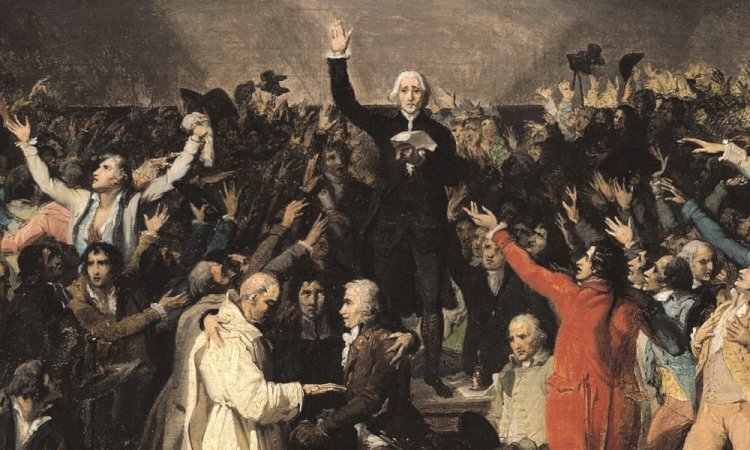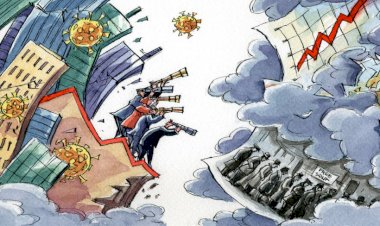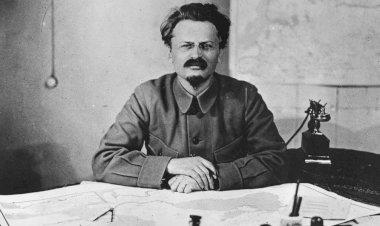Modernism and Enlightenment at the Target

The Second Article of the Marxsim vs Post-modernism article series.
Read the first part: What is Left for The Left, After Post-Modernism?
The 20th century was oppressed with more blood and tears than the centuries before itself. Capitalism did not hesitate to call at the rescue of barbarism in every crisis that was fostered by the contradictions it could not overcome. The inter-nation-state tensions upon which capital was shaped brought about the destruction of two world wars; German capitalists relied on fascism to keep the system alive, the world experienced the shock of mass murder in the gas chambers; the way for the USA to sit on top of the world was laid with atomic bombs ...
Who was responsible for this "new" barbarism? The Frankfurt School declared the Enlightenment responsible for a new barbarism of humanity, contrary to what it had promised. A line of thought extending from this school to the theorists of postmodernism identified modernization with the Enlightenment, regarding it as the creator of all evils. The “post-” label already presupposed a break with modernism. This intellectual perspective pumped a deep feeling of pessimism as it declared the death of the collective agent (which is subjectivized by the Enlightenment) and the individual who created it. The domination of the structure was absolute, although its content varied such as ideology, systems of domination, state and so forth.
In reality, barbarism was prevalent in the world also before the Enlightenment period. The nature and human beings were plundered from Africa to America since the 16th century in order to provide primitive accumulation that is essential for the development of capitalism; the working classes were exploited for a long time: “Between the end of the 17th century and the beginning of the 19th century, some 12 million Africans crossed the Atlantic. About 1.5 million of them died during the journey… The mortality rate was incredibly high among slaves who were malnourished on the plantations, overworked and disciplined with whip” (Faulkner). While the French Revolution rose with the slogans of equality, freedom, fraternity; in other parts of the world, capital was fed by slave labor or the blood and sweat of women and children, working in terrible conditions. Seeing that the French Revolution's promises of equality, fraternity and freedom were not realized, the laborers rebelled many times since the Babeuf Rebellion and were bayoneted just like African slaves in return. The bourgeoisie washed the lands and pavements of Paris in 1871 with the blood of the 20 thousand Communards. In short, capitalism has maximized the barbarism of class societies since its birth: “If money, according to [Marie] Augier, 'comes into the world with a congenital blood-stain on one cheek', capital comes dripping from head to foot, from every pore, with blood and dirt” (Marx, ).
The Matter of Enlightenment
Although the Enlightenment was turned into a target by postmodernists, it was not possible for the Enlightenment to be an intellectual and social movement detached from the period in which it developed. If we talk about the three critical intellectual periods in the transition from feudalism to capitalism in Europe, these will be the Renaissance, the Reformation and the Enlightenment. These intellectual leaps played major revolutionary roles in their time. The Great French Revolution also expresses the most radical climax of this intellectual tradition. But disappointment will soon follow.
Enlightenment was based on three basic claims. The first was the claim that natural phenomena are subject to laws of nature (as social events to social laws) and that humans can grasp these laws with reason and without the need for religion. The second was the idea that every society moves along the same course of development in a linear direction, if not at the same pace. Enlightenment had a progressive understanding of historical development. The third was the claim that human beings have universal rights stemming from merely being human, regardless of their religion or social status. With these basic assumptions, Enlightenment raised the radical critique of its era in the field of scientific method, social theory, and personal values. It argued that with reason, people can free themselves from the dogmatism of mystical forces/religion; understand and change the world through empirical knowledge and achieve prosperity and freedom. This intellectual movement would also inspire prominent figures of the American and French Revolution such as Robespierre, Jefferson, Paine.
The Enlightenment put forward a secular worldview in advocating the idea that the individual could grasp and manage the world with his own reason. This perspective was a direct ideological attack on the rulers of feudalism, who ruled society with the power received from a divine authority. It was no coincidence that the most radical names of the Enlightenment period emerged from France, where the political domination of capitalism was settled by a revolution. The development of capitalism also required the individual to be centered. Capitalist production relations required the people to become "free" laborers and free from feudal obligations. It was no longer the time of the peasants who are bought and sold with the land, but the "free" laborers who were given jobs when needed and left to starve when they were not. On the other hand, as the rulers of feudalism were based on divine authority, the bourgeoisie needed a "democratic" state based on the claim of self-government. Unlike the class societies that preceded it, capitalism's appropriation of surplus value took place in the field of economy. Therefore, the political and economic authority did not need to be unified, and the specialization of the very detailed political administration together with the nation-state model was also convenient for the capitalists to concentrate on their economic affairs. Considering that capital is already in competition, it was ideal for the political administration to become distinct and to be the guardian of the general interests of capital. In addition to all these, the claim that the people govern themselves (parliamentary system, voting right, elections) has always been an important source of legitimacy in terms of the capitalist order.
What about Modernism?
Modernism was seen as a stage in the development of human society by both proponents and opponents thinkers. Modernity developed on the basis of political, social, and intellectual transformations created by the Renaissance, Reform and Enlightenment movements. Although the time interval to define modernity is controversial, there seems to be a commonality in some parameters that constitute modernity: scientific discoveries, industrialization, population changes, urbanization, nation-state, mass movements, specialization, technology, rationalization, democracy, secular lifestyle...
The following statements of the Communist Manifesto describe modernity with its great turmoil and transformations, which express a great break from the age before it:
“Constant revolutionising of production, uninterrupted disturbance of all social conditions, everlasting uncertainty and agitation distinguish the bourgeois epoch from all earlier ones. All fixed, fast-frozen relations, with their train of ancient and venerable prejudices and opinions, are swept away, all new-formed ones become antiquated before they can ossify. All that is solid melts into air, all that is holy is profaned, and man is at last compelled to face with sober senses his real conditions of life, and his relations with his kind.” (Marx & Engels, Manifesto of the Communist Party).
Modernism has been a civilization shaped by capitalism becoming the dominant mode of production at the global level. Social developments driven by the capitalist world market that emerged since the 1500s have had an impact on both societies and individuals' lives and values. Modernism is a combination of economic, political, and cultural features that emerge in a world dominated by capitalism. In every corner of the world (and of course in these lands) modernization is conceived as inclusion in capitalist civilization, the creation of the economic, political, and social conditions for the development of industrial capitalism. The establishment of commodity economy, technological progress, nation-state formation, and a legal-secular-rational management approach dominating the state were some notions that comes to mind.
Unlike the previous modes of production, capitalism subordinated almost all economic relations in the world when it became the dominant model on a global scale. Even in the most backward corners of the world, the principles of the commodity economy have become operational. The effect of this situation on homogenizing individual and social experiences around the world is very evident. As a result, while the commodity economy united the laborers who will carry out the production activities in their workplaces, the city population has grown. While mechanization increased in order to maximize profits in production, the education level of the working classes increased; mass education with a similarized content has become a world phenomenon. Nation-states, on which capital would flourish most strongly, played a critical role for capitalism; The most ideal form of government in these nation-states - as long as things went well for the ruling class, of course - was a "democratic" understanding of government.
How is Marxism located within the Enlightenment?
Is Marxism part of the Enlightenment tradition? Is it a continuation of it? Enlightenment was an intellectual movement that spanned the 18th century. Of course, throughout the history of humankind, every intellectual-scientific development has been realized through the accumulation of previous scientists-theorists-philosophers. Marx also used the theoretical expansions of his predecessors to explain capitalism and discover the way to bring it down: Adam Smith and David Ricardo’s labor theory of value, Hegel's dialectic, Feuerbach’s materialism, Babeuf’s socialism… The list goes on. The claim of the Enlightenment Age, “nature and society can be grasped by the human reason” was shared by Marxism, yes. But as soon as capitalism declared its victory over feudalism, it became reactionary; it had put science at the service of his own class interests for the most part. Marx was the first to reveal this fact, hammering the last nail in the Enlightenment's coffin that was buried by the bourgeoisie. Perceiving the world through the war between classes, Marxism revealed the essence of the rule of reason by declaring that science is not supra-class and that existing scientific activities are at the service of the ruling class. This materialist conception of history was the supersession of the Enlightenment. While the idealism of the Enlightenment described history as the progress of reason and science, Marxism ended the myth of the imaginary independence of science and reason by declaring “the history of all hitherto existing society is the history of class struggles”.
On the one hand, Marxism has set the alarm bells ringing for capitalists by transforming social theory into a tool that unfolds the functioning of capitalism and the method of overcoming it. The revolutions of 1848 were a turning point in terms of the end of the bourgeoisie's capacity to play an advanced role. Confronting the working class on the street during the 1848 revolutions, the bourgeoisie quickly discovered the danger of establishing capitalism with revolutionary breakthroughs and sought to reconcile with the rulers of feudalism and gradually seize political power. It was the bourgeoisie itself that relied on the power of tradition to bring the genie (revolutionized lower classes) back into the bottle again: religion was called in, the conservative family was put on its feet in a new way. The so-called rule of reason was nothing but the regulation of reason and science within the interests of capitalist production.
Postmodernists place reason and science on the target board, from an idealistic perspective, as if ideas could develop and progress independently of material life. They blame the Enlightenment for disregarding values and purposes and putting science and reason into the center. Today, the engine of technological progress is that the means of production are under the control of capitals in competition with each other, and the private property in this field brings technological developments for more profit and/or more intensive plunder of nature. It is no coincidence that the sectors with the most intense technological developments are the field of weapon technology with R&D studies for production. In short, science, intelligence, technology are not self-proclaimed forces that take society captive; on the contrary, they are tools shaped around the interests of the bourgeoisie.
Finally, let us state that the Enlightenment tradition sees historical development as a linear process, whereas Marxism approaches history with a dialectical perspective. From the standpoint of Marxism, history has a contradictory development, and apart from always moving forward, it is open to breakdowns, as Rosa Luxemburg expresses it in "either barbarism or socialism".
A Critique of Modernism: How?
From the very beginning of capitalist modernity, there has been a wide political spectrum calling for a romantic longing for the past, frightened by the great transformations it has brought to life. Romantic criticism of capitalism can be based on a conservative basis as in the example of Edmund Burke, or it can find its reflections in a liberal theorist as in Weber, through opposition to the instrumentalization of reason leading to the expulsion of the purpose from nature.
In his Grundrisse, Marx explained how bourgeois thought cannot go beyond modernism and its antithesis romanticism:
“In bourgeois economics – and in the epoch of production to which it corresponds – this complete working-out of the human content appears as a complete emptying-out, this universal objectification as total alienation, and the tearing-down of all limited, one-sided aims as a sacrifice of the human end-in-itself to an entirely external end. This is why the childish world of antiquity appears on one side as loftier(…) It is as ridiculous to yearn for a return to that original fullness as it is to believe that with this complete emptiness history has come to a standstill. The bourgeois viewpoint has never advanced beyond this antithesis between itself and this romantic viewpoint, and therefore the latter will accompany it as legitimate antithesis up to its blessed end.” (as cited in Callinicos).
We see the legitimacy of Marx's determinations in the postmodernist school. Postmodernism has taken over the critique of philosophical romanticism in the critique of modernity. Although postmodernist theorists label Marxism as part of the modernist project, modernity in terms of Marxism; is a global civilization that emerged as a combination of economic, political and cultural characteristics created by capitalism. Marxism puts forward the abolition of capitalist modernity and revealing the objective conditions necessary for this (such as the working class's reaching class consciousness, the possibilities of capitalism going into a deep crisis) and essentially fighting to mobilize the subjective forces (the working class) for this purpose. New societies, ranging from the workers' power aimed by Marxism to communism, are the only way to end the human alienation that romanticism worries about the most. Humanity will be able to prevent human alienation that affects all social relations only with the end of alienation from its labor. In a world where exploitation and surplus value disappear, human-nature integration will be possible again.
Works Cited:
1- Callinicos, A. Against Postmodernism: A Marxist Critique.
2- Faulkner, N. A Marxist History of the World: From Neanderthals to Neoliberals
3- Marx, K. ve Engels, F. Manifesto of the Communist Party.
4- Marx, K. Capital - I.




































